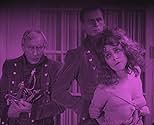Un homme fortuné invite de riches célibataires pour un spectacle d'ombres chinoises à propos d'hommes qui convoitent la femme d'un autre. Le montreur d'ombres est en réalité un sorcier qui m... Tout lireUn homme fortuné invite de riches célibataires pour un spectacle d'ombres chinoises à propos d'hommes qui convoitent la femme d'un autre. Le montreur d'ombres est en réalité un sorcier qui met en scène des cauchemars sur ce qui pourrait se passer si les invités s'impliquaient ave... Tout lireUn homme fortuné invite de riches célibataires pour un spectacle d'ombres chinoises à propos d'hommes qui convoitent la femme d'un autre. Le montreur d'ombres est en réalité un sorcier qui met en scène des cauchemars sur ce qui pourrait se passer si les invités s'impliquaient avec la maîtresse de maison.
- Réalisation
- Scénario
- Casting principal
Avis à la une
The highlights here are the numerous inventive ways shadows are used to tell the story, and Rasp as the evil butler. He's long been a favorite of mine among German character actors, and I loved seeing this early role for him. .
This film is very interestingly photographed, full of sharp shadows against brightly lit walls that set some of the action, plus lavish period costuming and well-draped sets that look like they belong on a stage. The action is mostly slow and dreamlike, a bit too slow at times as this drags just a little through parts. Still, very interesting to see. The print on the DVD, tinted in sepia/yellow, pink, and bright lavender tones, looks quite nice. The music score is excellent and suits this very odd silent film quite well.
Most of it passes with little notice, a night of erotic angst, rivalry and a marriage falling apart with the lavish mansion of a baron as the stage of the theater. The prospective lovers feign and thrust, eventually really thrust; we get to see this in shadows. Shadows, a nocturnal hallucination as the title goes. It's the arrival of a shadow-player that is the most intriguing here. Oh, eventually his magick tricks were all serving a benign purpose, domestic bliss is salvaged from desire most foul, the soul restored into proper order.
The trick is that he gives the parties involved a vision of what might unfold, the dangers involved. His small audience wakes up from the cinematic illusion dazzled, baffled, rubbing their eyes with disbelief. And we pull further back in the final shot to see curtains falling on this level that we experienced as reality.
Is everything inside the nested story so artificial because it was the times still inflected by theater, or because the shadow play is inherently artificial? Is the shadow player the protagonist himself, made from his mirrored image, and so conjuring for himself a wish-fulfillment illusion where everything is made alright?
If you were looking to come to this for German expressionism, you might want to reconsider. There is a great shot of the illusionist pushing back, elongating the shadows of his players. But it's serving and is part of the great self-referential tradition of cinema, films about the illusion of watching films.
Le saviez-vous
- GaffesWhen the ShadowPlayer asks the servant (Fritz Rasp) to get the sheet for his shadow show, he pulls off the middle button on the left side of his vest. For the remainder of the movie, the button is back on.
- Versions alternativesThere is an Italian edition of this film on DVD, distributed by DNA Srl: "I MISTERI DI UN'ANIMA (1926) + OMBRE AMMONITRICI (1923)" (2 Films on a single DVD), re-edited with the contribution of film historian Riccardo Cusin. This version is also available for streaming on some platforms.
- ConnexionsFeatured in Kingdom of Shadows (1998)
Meilleurs choix
- How long is Warning Shadows?Alimenté par Alexa
Détails
- Durée
- 1h 30min(90 min)
- Couleur
- Mixage
- Rapport de forme
- 1.33 : 1

![Regarder Trailer [OV]](https://m.media-amazon.com/images/M/MV5BNjZhZTdiODEtOTBlZS00YmM4LTkwMzYtYzdkZTY2OTZlNTg2XkEyXkFqcGdeQXRyYW5zY29kZS13b3JrZmxvdw@@._V1_QL75_UX500_CR0)





























